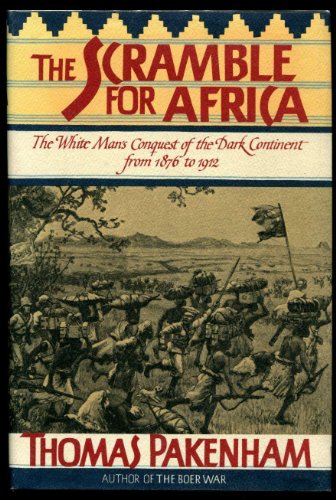The Scramble for Africa
White Man's Conquest of the Dark Continent from 1876 to 1912
Thomas Pakenham
BOOK REVIEW

The Scramble for Africa: White Man's Conquest of the Dark Continent from 1876 to 1912 by Thomas Pakenham isn't merely a book; it's a harrowing journey into a time when imperialism clawed at the very heart of a continent, ripping apart societies with an insatiable hunger for power and resources. It's a historical narrative that resonates like an echoing gunshot across the ages, calling into question the moral fabric of human ambition. With a staggering depth of research and vivid storytelling, Pakenham transforms dry facts into a visceral exploration of conquest, greed, and the human cost of empire-building.
Brace yourself as you delve into the pages that dissect the turbulent clash between European powers as they divided Africa amongst themselves, treating it as a chessboard rather than a home to millions. The narrative spans from 1876, when explorers like Henry Morton Stanley trekked into the heart of Africa with maps and a thirst for adventure, to the dawn of the 20th century, where the continent had been carved up, leaving scars that are still visible today. This isn't a mere recounting of events; it's a plunge into the depths of ambition, where the lure of gold and glory drowned out the cries of the oppressed.
Pakenham's exhaustive accounts breathe life into the historical figures who orchestrated this frenzy. Cecil Rhodes, a man of immense vision and equally immense hubris, emerges as a pivotal character. His dream of a railway spanning the continent, connecting Cape to Cairo, is a testament to the era's relentless pursuit of progress at any cost. Yet this "progress" came at the expense of entire nations - a paradox that Pakenham lays bare with unflinching honesty. The reader can't help but feel a swell of indignation at the sheer audacity of these imperialists, who, in their quest for dominance, disregarded the humanity of those they subjugated.
Critics and readers alike have been divided on Pakenham's approach. Some hail him as a masterful storyteller who brings the past into stark focus, while others argue his narrative skirts the line of glorifying conquest. However, the shocking reality of the atrocities committed-the exploitation, the violence, the cultural erasure-remains undeniable. Pakenham offers no sanitized version of history; he presents the chaos and brutality inherent in the colonial enterprise, making it impossible to turn away. This is a narrative packed with the moral complexity that modern readers crave-nudging us to interrogate our own contemporary society in the light of such historical shadows.
Through contrasting perspectives, readers are compelled to engage with the uncomfortable truths buried in their own national mythologies. The comments from those who have traversed this narrative reflect a spectrum of emotions: outrage, sorrow, and a deeper understanding of the historical forces that shape our world today. Many express a profound need to confront the legacies of colonialism, making "The Scramble for Africa" not just informative but also transformative.
As you soak in Pakenham's meticulous storytelling, you will find yourself grappling with the weight of history. Feel the anger surge within as you uncover the chilling truths of exploitation and imperialism. The journey is not easy, but it is necessary-a mandatory pilgrimage through the darker sides of human ambition.
In conclusion, The Scramble for Africa is not just a collection of dates and accounts; it is a powerful reminder of the fragility of sovereignty and the human spirit. It confronts you, the reader, with challenging questions about morality, power, and the dire consequences of an unbridled quest for expansion. Reading this book is akin to standing at the edge of a precipice, forced to reckon with the depths of human history that stretch below. It's a compelling, gut-wrenching exploration of a past that continues to shape our present-a narrative you cannot afford to ignore.
📖 The Scramble for Africa: White Man's Conquest of the Dark Continent from 1876 to 1912
✍ by Thomas Pakenham
🧾 738 pages
1991
#scramble #africa #white #mans #conquest #dark #continent #from #1876 #1912 #thomas #pakenham #ThomasPakenham